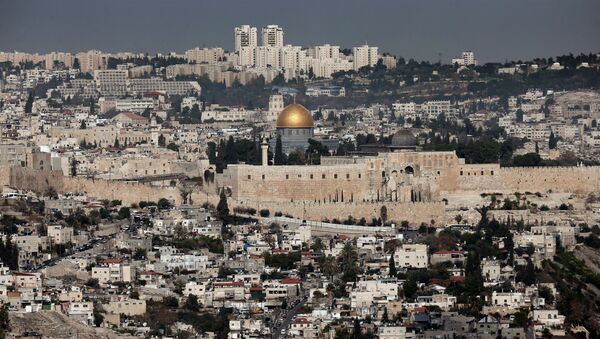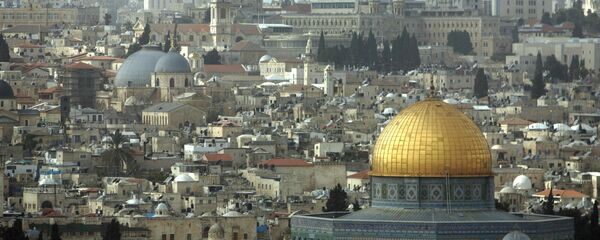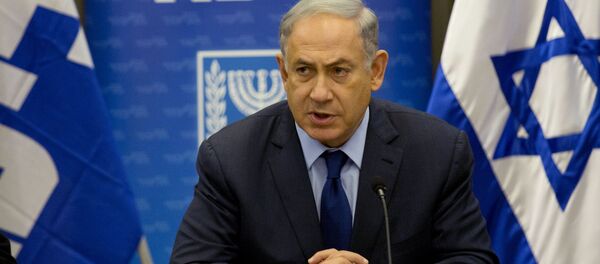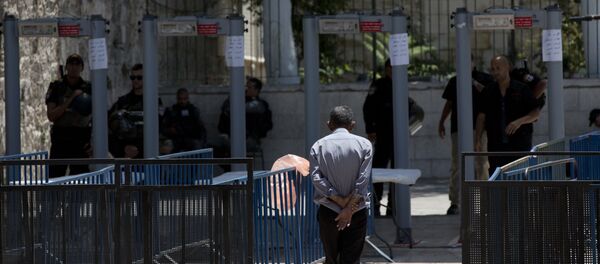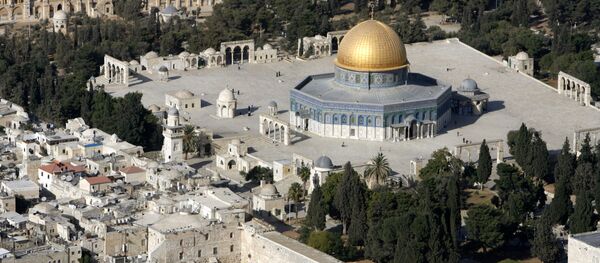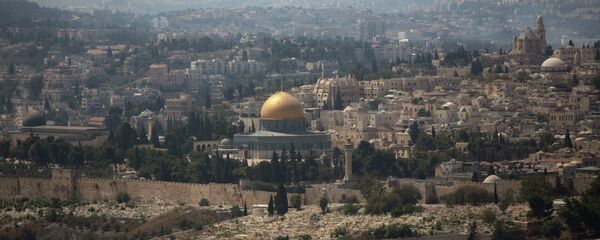"Get down, quick!" an Israeli police officer told a group of scared Palestinian women hiding on a side street. After they moved on, he tossed two stun grenades, one after another, in the direction of their movement. They exploded several feet from them. This came as another episode of riots that engulfed Jerusalem’s Old City on Thursday evening.
Another police officer wearing a black helmet looked out from behind a corner down below and reprimanded his colleague. "Are you completely crazy? Can’t you see that we are here?" he asked.
Nearby, police were detaining a Palestinian offender. Clad in tight-fitting jeans, he was kicking his legs wildly and even managed to throw an Israeli officer over a low stone parapet. Two other police officers were yelling and swinging their batons to keep the young man’s friends at bay. Indignant and compassionate onlookers were filming the altercation on their cellphones.
After the riots flared up, police cordoned off Lions’ Gate Street leading up to Temple Mountain, the birthplace of the Mother of God and the Mount of Olives with its Gethsemane garden, where Jesus Christ prayed. Using stun grenades, police officers forced the panicky passersby to leave the vicinity.
Two police officers prevented the people from going back. They held them at gunpoint, hiding behind a wooden barrel with their guns that fire hard-hitting bullets tipped with allegedly soft, spongy material. The only exit led to an adjacent street where black-gray police uniforms could occasionally be seen. Unseen to those inside the blind alley were police officers clashing with rioters and medical personnel wearing orange vests dragging stretchers with wounded people in the opposite direction.
According to Red Crescent officials, over 120 people were injured by the end of the day. The parties to the conflict have different opinions as to how it all started. Israel claims the violence began when police officers were pelted with stones near Temple Mount mosques. Some of them fell on a square near the Wailing Wall, the main shrine of the Jewish world. While overlooking the stone-throwing episode, Arabs accuse Israelis of blocking the entrance to the Temple Mount. Various eyewitness accounts claim that police had ousted protesters through Bab Al Huta Gate before closing it to the displeasure of worshipers gathered outside.
A journalist from a Western media outlet believes that Israel had its reasons for aggravating the situation. "Today, Israelis desperately need a statement proving who runs the city," he said while sitting in a blind alley sealed by police.
Visiting the Shrine
Violent riots in central Jerusalem dampened the Arab Muslim community’s optimism about the resumption of prayers on the Temple Mount and partly eroded its sense of victory during the two-week protest campaign. Worshipers agreed to return to the Al-Aqsa and Qubbat-as-Sahra mosques only after the Israelis dismantled metal detectors at the holy sites's entrances.
"Haven’t you been inside? Everything turned out to be highly emotional over there. We experienced joy, euphoria and exultation, and tears gushed from our eyes. We did not immediately enter the mosque, and we waited for those walking through other gates to gather here. After that, all of us entered and prayed inside Al Aqsa," Majdi Fahmi, a resident of Jerusalem, told foreign journalists who decided to stay outside rather than violate the strict regulations for entering the Temple Mount.
People have not prayed at the holy site since July 14. Virtually the entire local Arab Muslim community refused to abide by new security regulations, claiming they infringed their right to visit the shrine. Protesters crowded on city streets several times a day and conducted prayers that often escalated into clashes with police. According to medical personnel, five Palestinians have been killed and about 1,000 wounded so far. It is also believed that the situation around the Temple Mount prompted a 19-year-old Arab resident from the West Bank to enter a Jewish settlement and kill three people.
Arabs, meanwhile, did not accept Israel's statements that metal detectors and video cameras had been installed after two police officers were killed in the Old City district. This refusal was in spite of the fact that such security measures had been adopted at holy sites all over the world, including at the Vatican, Mecca and the Wailing Wall. Those who took to the streets did not believe the assurances about an unshakable status quo meaning that Temple Mount was controlled by a Muslim administration, that only Muslims can pray there, and that representatives of other religious denominations are free to visit it.
"We know this is not the end, and that there will be other encroachments. Nevertheless, this is a major success. We have won not because they have removed metal detectors but because we have rallied together as never before, we have realized and let it be known to others how much Al Aqsa means to us. It means virtually everything to us," Fahmi said. Just like many others of his fellow Palestinians, he is confident that Israel is secretly hoping to reinstate a Jewish temple here, the third one after those built by kings Solomon and Herod.
One Thousand Gandhis Score Victory
"In my reports, I said that 20,000 Gandhis are standing here. Israel tried unsuccessfully to portray local developments as extremism," she said.
Moderate Palestinian leader Mustafa Barghouti, a member of the Palestine Liberation Organization’s Executive Committee and general secretary of the Palestinian National Initiative, believes that the latest developments show the effective nature of civil protests. In his opinion, these protests can be organized in the future in other parts of the country.
"This is a major victory, first and foremost, for the Palestinian nation, the people of Jerusalem. The latter have accepted the idea of non-violent resistance. What has happened here confirms our opinion that a non-violent struggle is the best and most profitable option for the Palestinian nation. People here in Jerusalem have shown this," he told Sputnik, lapsing into Russian during the interview.
"This is exactly what I have been advocating for the last 15 years. We have used these methods in the past, but such events have never acquired nationwide scope. We have started with Jerusalem, and I am confident that we will continue in other cities," he said.
Has Netanyakhu Surrendered?
Respondents apparently remained unconvinced by the military-political cabinet’s plans to present a decision to stop using metal detectors in favor of introducing a hi-tech "intelligent screening" system, due to be introduced in the next six months. Police said the other day that the situation was the same as before July 14 and repeated the main demand of Muslim Arabs, word for word.
The conflict around the Temple Mount went international in no time at all. It became the subject of emergency UN Security Council meetings, those of the Arab League and the Organization of Islamic Cooperation. It provoked a verbal termination of relations between Israel and the Palestinians, and a heated verbal exchange with Turkey. Ankara has just mended its relations with Israel and is planning to implement some ambitious joint projects with the Jewish state, including joint gas deliveries to the European market.
Jordan that had controlled Jerusalem and its Old City before 1967, played a key role in resolving the conflict. King Abdullah II of Jordan holds the status as keeper of the city’s religious relics and shrines under a peace treaty with Israel, and has great influence over the local clergy. Palestinian leaders have been virtually excluded from the peace process, diplomats say. Quite possibly, this decision offended Ramallah, which issued a statement highlighting intensive contacts between President Mahmoud Abbas and King Abdullah II.
Political commentators are wondering how the latest diplomatic incident in Amman may influence the resolution of the crisis around the Temple Mount. A security guard at the Israeli diplomatic mission in the Jordanian capital shot and killed two local residents after fending off an attack, the circumstances of which are largely unclear. After the incident, Israel pressed for the evacuation of its embassy’s personnel, particularly the above-mentioned security guard.
The Israeli Prime Minister’s office immediately said that Jordanian partners were not trying to link both issues, and that any package deal was out of the question. This did not prevent analysts from claiming that King Abdullah II had received an important trump card in his dialogue with Netanyahu after the incident. The latter has apparently received a strong argument for making concessions on the Temple Mount issue, and he can present this argument to his right-wing partners and thus reduce the political fallout.

